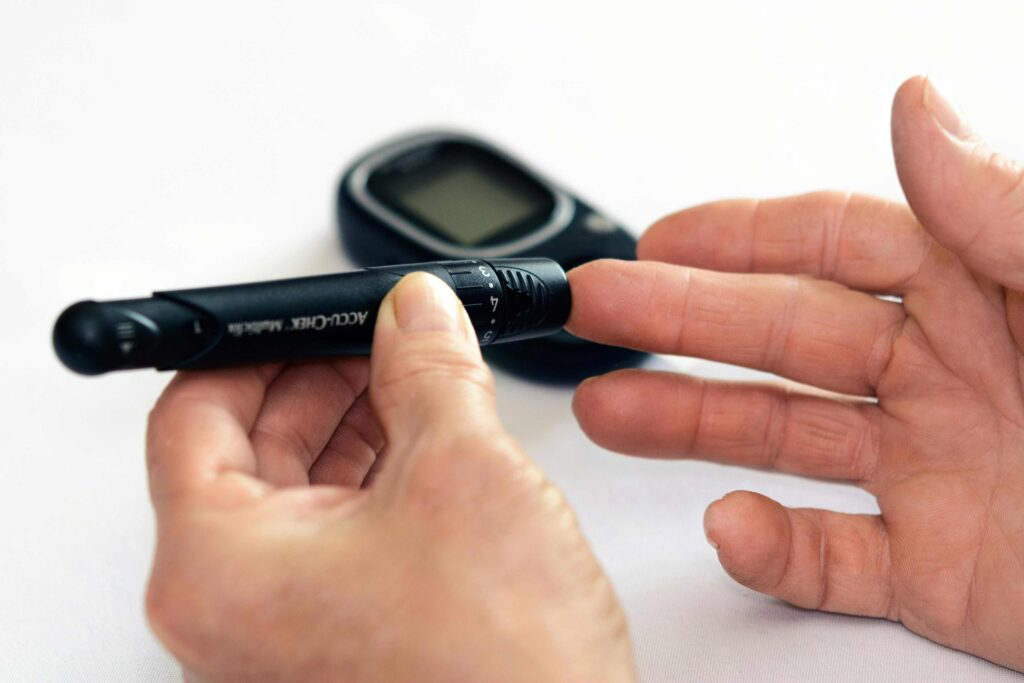
Having type 1 diabetes can be challenging, as it requires careful management of blood sugar levels. But what if there was a way to potentially reduce the need for insulin and improve glycemic control? Enter the ketogenic diet for diabetes type 1. The ketogenic diet is a low-carb, high-fat eating plan that has gained popularity for its potential health benefits. In recent years, researchers studied how this diet affects type 1 diabetes patients, with encouraging results.
Incorporating the principles of a ketogenic diet involves drastically reducing carbohydrate intake and increasing fat consumption. This change in nutrient ratios can cause ketosis, where the body burns fat for fuel instead of glucose. For type 1 diabetics, this may lead to stable blood sugar levels and less need for insulin.
The ketogenic diet can help improve glycemic control and overall health for some with type 1 diabetes.
The Ketogenic Diet For Type One Diabetes.What is a Ketogenic Diet?
A keto diet is a low-carb, high-fat plan used for epilepsy. Goal is ketosis, using ketones for fuel from fat breakdown. Benefits include weight loss and mental clarity.
To achieve ketosis, individuals following a ketogenic diet typically consume less than 50 grams of carbohydrates per day, while significantly increasing their intake of healthy fats. This macronutrient distribution forces the body to rely on fat for energy, leading to the production of ketones. It’s important to note that the ketogenic diet is not just a low-carb diet; it is specifically designed to induce ketosis and reap the associated benefits.
The Ketogenic Diet For Type One Diabetes.Understanding Type 1 Diabetes
Before discussing the benefits of the ketogenic diet for type 1 diabetes, it’s important to understand the condition. Type 1 diabetes is an autoimmune disease where the immune system attacks insulin-producing cells in the pancreas.
Output: “To understand type 1 diabetes, know it’s an autoimmune disease where the immune system attacks insulin-producing cells in the pancreas.”
This results in a complete or near-complete deficiency of insulin, the hormone responsible for regulating blood sugar levels.
Type 1 diabetics rely on insulin for stable blood sugar levels, posing a significant challenge.
Benefits of The Ketogenic Diet for Type One Diabetes

Research on the effects of a ketogenic diet for individuals with type 1 diabetes is still relatively limited. However, the existing studies and anecdotal reports suggest several potential benefits associated with this eating plan. It’s important to note that while the ketogenic diet may offer benefits, it should always be done under the guidance of a healthcare professional, as individual needs and responses may vary.
Improved Glycemic Control
One of the most significant potential benefits of a ketogenic diet for individuals with type 1 diabetes is improved glycemic control. By reducing carbohydrate intake and relying on fat for energy, the ketogenic diet can potentially lead to more stable blood sugar levels. This stability can help minimize the risk of hypoglycemia (low blood sugar) and hyperglycemia (high blood sugar), which are common challenges for those with type 1 diabetes.
Reduced Insulin Dependency
Another potential benefit of a ketogenic diet for individuals with type 1 diabetes is a decreased need for exogenous insulin. As the body adapts to using fat as its primary fuel source, the demand for insulin to process glucose decreases. This reduction in insulin requirements can lead to more flexibility in insulin dosing and potentially lower the risk of insulin-related complications.
Weight Management
Weight management is an important aspect of diabetes management, as excess weight can contribute to insulin resistance and poor glycemic control. The ketogenic diet has been shown to be effective for weight loss in various populations, and it may offer similar benefits for individuals with type 1 diabetes. By promoting fat loss while preserving lean muscle mass, the ketogenic diet can help individuals achieve and maintain a healthy weight.
Research and Studies on The Ketogenic Diet For Type One Diabetes
While research on the effects of a ketogenic diet specifically for individuals with type 1 diabetes is still in its early stages, several studies have explored the potential benefits of low-carbohydrate diets in general. These studies provide valuable insights into the potential impact of a ketogenic diet on blood sugar control and insulin requirements.
A Pilot Study
A pilot study published in 2018 investigated the effects of a low-carbohydrate, ketogenic diet on glycemic control and insulin requirements in individuals with type 1 diabetes. The study included 18 participants who followed a ketogenic diet for 12 weeks. The results showed a significant reduction in HbA1c levels (a measure of long-term blood sugar control) and a decrease in insulin requirements. However, it’s important to note that this study had a small sample size, and further research is needed to confirm these findings.
Anecdotal Reports
In addition to formal research studies, there are numerous anecdotal reports from individuals with type 1 diabetes who have successfully incorporated a ketogenic diet into their diabetes management plan. These reports suggest improvements in glycemic control, reduced insulin requirements, and an overall improvement in quality of life. While anecdotal evidence should be taken with caution, these reports provide valuable insights into the potential benefits of a ketogenic diet for individuals with type 1 diabetes.
Getting Started With The Ketogenic Diet For Type One Diabetes
Before starting a ketogenic diet, it’s essential to consult with a healthcare professional who is knowledgeable about both type 1 diabetes and the ketogenic diet. They can provide personalized guidance and help you navigate any potential challenges or risks associated with this dietary approach.
Here are some general steps to consider when getting started with a ketogenic diet for type 1 diabetes:
Educate Yourself
Take the time to educate yourself about the principles and requirements of a ketogenic diet. Understand the macronutrient ratios, food choices, and potential side effects associated with this eating plan. The more informed you are, the better equipped you will be to make informed decisions and monitor your progress effectively.
Set Realistic Goals
Determine your specific goals for incorporating a ketogenic diet into your diabetes management plan. Whether it’s achieving better glycemic control, reducing insulin requirements, or improving overall health, setting realistic goals will help you stay motivated and track your progress.
Start Slowly
Transitioning to a ketogenic diet can be challenging, especially if you are used to a higher-carbohydrate eating pattern. Instead of making drastic changes overnight, consider gradually reducing your carbohydrate intake while increasing your fat consumption. This gradual approach can help minimize potential side effects and make the transition more manageable.
Monitor Your Blood Sugar Levels
Regular monitoring of your blood sugar levels is crucial when following a ketogenic diet with type 1 diabetes. Keep a close eye on your readings and adjust your insulin dosing as needed to maintain stable blood sugar levels. Work closely with your healthcare professional to determine the frequency and timing of blood sugar checks and make any necessary adjustments to your diabetes management plan.
Seek Support
Embarking on a ketogenic diet journey can be challenging, especially when managing a complex condition like type 1 diabetes. Seek support from healthcare professionals, diabetes educators, and online communities to help you navigate any obstacles or questions that may arise. Connecting with others who have similar goals can provide valuable insights, motivation, and encouragement along the way.
Key Considerations When Following The Ketogenic Diet For Type One Diabetes

A ketogenic diet can benefit type 1 diabetes, but key considerations are important for safety and effectiveness.
Individual Variability
It’s important to recognize that everyone’s response to a ketogenic diet may vary. What works for one person may not work for another, and individual needs and preferences should be taken into account. The impact of a ketogenic diet on blood sugar control and insulin requirements may also differ from person to person. Working closely with a healthcare professional can help you determine the most suitable approach for your unique circumstances.
Nutritional Adequacy
When following a ketogenic diet, it’s crucial to ensure that you are meeting your nutritional needs. Since the diet restricts carbohydrate-rich foods, it’s important to focus on nutrient-dense sources of fats, proteins, and non-starchy vegetables. Consulting with a registered dietitian who specializes in ketogenic diets can help you create a well-balanced eating plan that meets your nutritional requirements.
Potential Side Effects
Transitioning to a ketogenic diet can trigger various side effects, commonly referred to as the “keto flu.” These side effects may include fatigue, headache, nausea, and dizziness. However, these symptoms are typically temporary and can be controlled by ensuring adequate hydration, increasing electrolyte consumption, and slowly adapting to the new eating regimen.. If you experience any severe or persistent side effects, consult with your healthcare professional.
Monitoring Blood Sugar Levels On The Ketogenic Diet For Type One Diabetes
When following a ketogenic diet with type 1 diabetes, monitoring your blood sugar levels becomes even more critical. Here are some tips for effectively monitoring your blood sugar levels on a ketogenic diet:
Regular Testing
Frequent testing of your blood sugar levels is essential when following a ketogenic diet. Regular testing will help you identify any patterns or trends in your blood sugar control and make any necessary adjustments to your insulin dosing or dietary choices.
Continuous Glucose Monitoring (CGM)
Consider using a continuous glucose monitoring (CGM) system to track your blood sugar levels throughout the day. CGM devices provide real-time data, allowing you to monitor your blood sugar trends and make informed decisions about your diet and insulin dosing.
Adjusting Insulin Dosing
As your carbohydrate intake decreases on a ketogenic diet, your insulin requirements may also decrease. It’s important to work closely with your healthcare professional to adjust your insulin dosing accordingly. Regular communication and collaboration will help ensure that your diabetes management plan aligns with your dietary choices.
Meal Planning And Recipes On The Ketogenic Diet For Type One Diabetes

Meal planning is a crucial aspect of successfully following a ketogenic diet with type 1 diabetes. Here are some general guidelines and recipe ideas to help you get started:
Focus on Healthy Fats
Choose healthy fats such as avocados, nuts, seeds, olive oil, coconut oil, and fatty fish as the foundation of your meals. These fats provide essential nutrients and help keep you satiated.
Include Adequate Protein
Opt for high-quality protein sources such as lean meats, poultry, fish, eggs, and plant-based proteins like tofu and tempeh. Protein plays a vital role in supporting muscle maintenance and overall health.
Emphasize Non-Starchy Vegetables
Non-starchy vegetables like leafy greens, broccoli, cauliflower, zucchini, and bell peppers are low in carbohydrates and high in fiber. They provide important vitamins, minerals, and antioxidants while keeping your total carbohydrate intake in check.
Limit Carbohydrate Intake
Minimize your consumption of high-carbohydrate foods such as grains, starchy vegetables, sugary snacks, and processed foods. Instead, focus on nutrient-dense, low-carbohydrate options that align with a ketogenic diet.
Stay Hydrated
Maintain adequate hydration by drinking plenty of water throughout the day. Proper hydration is crucial for overall health and can help minimize potential side effects associated with the ketogenic diet.
For recipe ideas and meal planning resources, consider consulting with a registered dietitian who specializes in ketogenic diets or exploring reputable online sources.
The Ketogenic Diet For Type One Diabetes.Common Challenges
Following a ketogenic diet with type 1 diabetes can present unique challenges. Here are some common challenges and strategies to overcome them:
The Keto Diet For Type One Diabetes.Hypoglycemia Risk
Reduced carbs on a keto diet can up hypoglycemia risk. Monitor blood sugar, adjust insulin, have glucose handy for low sugar..
The Keto Diet For Type One Diabetes.Nutrient Deficiencies
Limiting carbohydrate-rich foods may result in nutrient deficiencies if dietary choices are not well thought out. Collaborate with a certified dietitian to guarantee that your ketogenic diet is nutritionally sound and incorporates a range of nutrient-dense foods.
The Keto Diet For Type One Diabetes.Social Situations
Navigating social situations and dining out while following a ketogenic diet can be challenging. To overcome this, plan ahead by researching menus, communicating your dietary needs to the host or restaurant staff, and bringing keto-friendly snacks or dishes to share.
The Ketogenic Diet For Type One Diabetes.Conclusion and Final Thoughts
The ketogenic diet offers an intriguing option for individuals with type 1 diabetes who are looking to improve glycemic control and optimize their overall health. While research in this area is still evolving, the existing studies and anecdotal reports suggest potential benefits associated with a ketogenic diet, including improved blood sugar control, reduced insulin requirements, and weight management.
Before embarking on a ketogenic diet, it’s crucial to consult with a healthcare professional who is knowledgeable about both type 1 diabetes and the ketogenic diet. They can provide personalized guidance and help you navigate any potential challenges or risks.
Remember, individual needs and responses may vary, and it’s important to monitor your blood sugar levels closely, adjust your insulin dosing as needed, and prioritize nutrient-dense food choices. With proper guidance and support, a ketogenic diet may be a valuable tool in your type 1 diabetes management plan, offering a potential avenue for improved glycemic control and overall well-being.